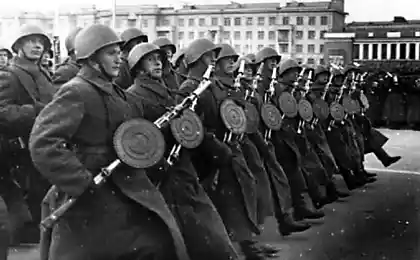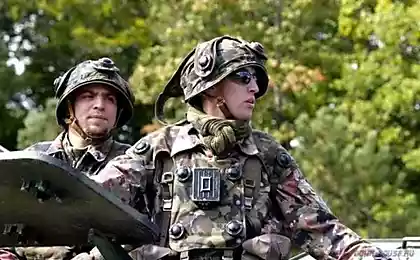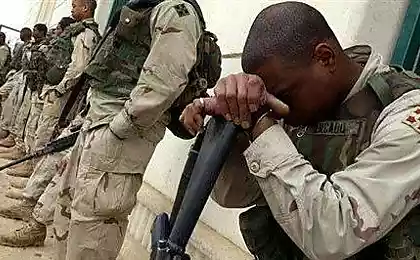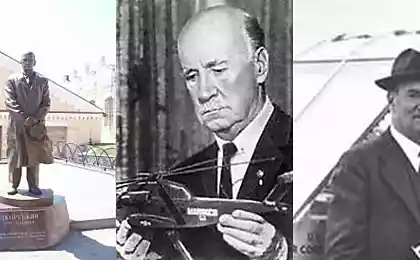617
Memo voenoplennogo US Army
If you
Will be taken into captivity
Here are your rights
10 photo.
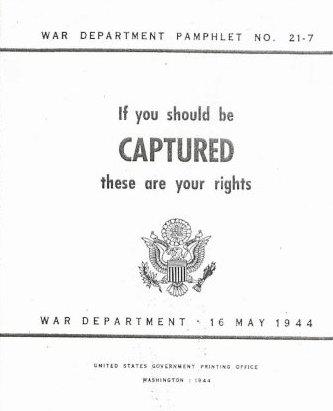
The purpose of this booklet introduce you to some of the rights of a prisoner of war. Knowing them can help to survive what is happening less severe and humiliating, if you still are not lucky and you will be captured by the enemy.
And remember this: The United States treat prisoners in accordance with the rules. You have the right to request from the prison you do the same.
Military Department,
25 Washington, DC, May 16, 1944
The pamphlet Military Department № 21-7. "If you will go into captivity, that's your right," published for the information and guidance of all concerned.
{A.G. 383.6 (21 Mar 44)}
By order of the Secretary of War:
Dzh.Si. Marshall
Chief of Staff
Responsibility:
Jay. Hey. Yulio
Major General,
Adjutant General
I'll be a prisoner of war.
You live behind barbed wire, under constant guard.
You can not move freely because the prisoners comes change. You are there for a long time.
Terrible monotony.
Everything reminds guardhouse with indefinite sentences. Everything happens harder and longer than the prisoners, whom you once saw as a security guard in the United States.
However, even in the guardhouse prisoners remained in a rich, friendly country. As a prisoner of war, you are in the enemy country, living with the enemy. You live no better than the enemy, and it is unlikely as well as American soldiers. If you're lucky, your invader will treat you no better than with his rear troops. In all countries of the Axis of food goes mostly to the front. In the rear of the population eats, what was left. As a prisoner of war, you do not have to count on one or the other.
Nevertheless, there are certain rules of war. "Geneva Convention on prisoners of war status" contains the rules that say what you should do and what you can do. She also says that the enemy can and can not do with you.
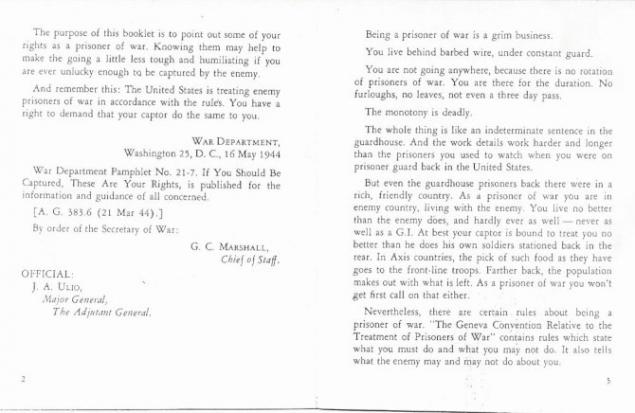
From the moment you captured you have certain rights. Even more, before you were taken to the prison camp, these rights are.
Defend their rights, but does it always with military courtesy and firmness. The enemy will respect you for it.
With you always have to be treated humanely.
Illegal punishment against you are not permitted. You can not be to punish for what he did anyone else.
You need to be protected from abuse or violence by the military or civilians of the enemy.
If you are injured or ill, you are entitled to the same medical treatment as soldiers of the enemy army.
The enemy is obliged to clothe, feed and provide you with shelter.
You are a prisoner of war, and not a criminal.
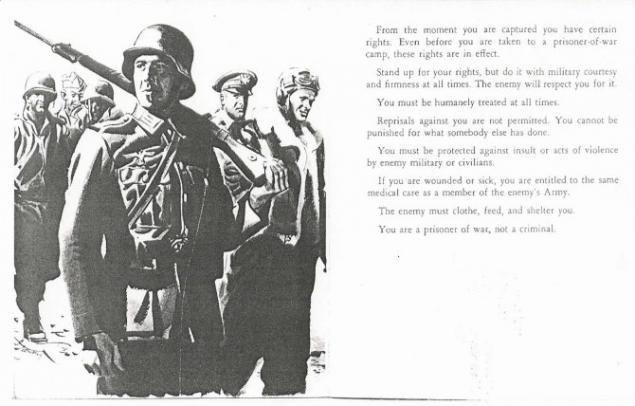
During the interrogation, regardless of the position of the enemy, you must give his name, rank and identification number. The enemy can not legally obtain other information from you.
Do not discuss with anyone else any military matters.
Soldier "allies" can be an agent of the enemy intelligence.
Forget everything you know about their Army. Do not say anything if someone wants to talk to you even minor details
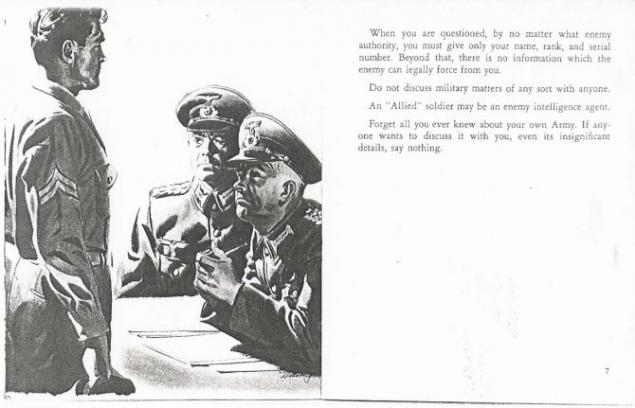
The enemy, grab you, you are obliged to hand over all military materiel, in addition to a helmet and a gas mask. In any case, the enemy does not have to take your personal belongings such as your documents, signs for the title, personal papers, wallet or photos (if they do not have military value).
You own the money can be taken only on the orders of an officer and after the determination of the exact amount. For this you are required to issue a receipt. Demand a receipt. It is your right.
Any money you have selected to be recorded in your own business, and returned after the liberation.
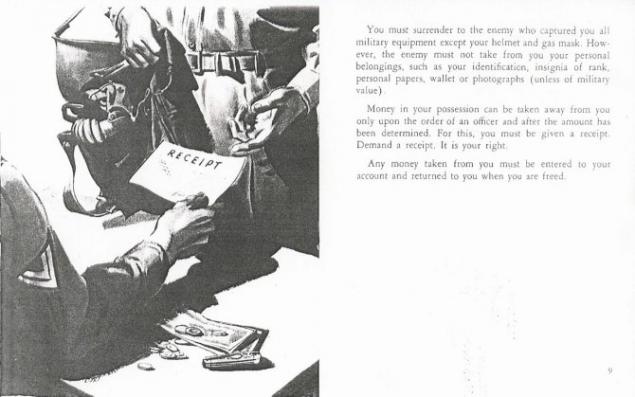
If you are an ordinary prisoner, then you have to give greetings to all officers. If you are a prisoner officer then you greet only enemy officers of equal or higher rank. You use your military salute, not the one the enemy.
With regard to other issues of military courtesy and discipline, you have the same rights and duties as the same enemy army soldier.
You are subject to all laws, regulations and orders in force in the army of the enemy. You may be subject to court and if found guilty, be punished for breaking the rules of the enemy. Nevertheless, in your punishment may not be accompanied by violence. In general, the arrest, detention and disciplinary action can be applied to you in the same way as a soldier of the enemy equal in rank.
If you try to escape and be captured, it can be subject to imprisonment not exceeding 30 days. However, if you use violence, then you can get punished much more than 30 days for attempting to escape. If you committed a civil offense, then you will be punished according to the civil laws of the enemy and the enemy tribunal.
After serving a sentence for attempted escape, the attempt will not be brought against you if you try to escape again and be caught.
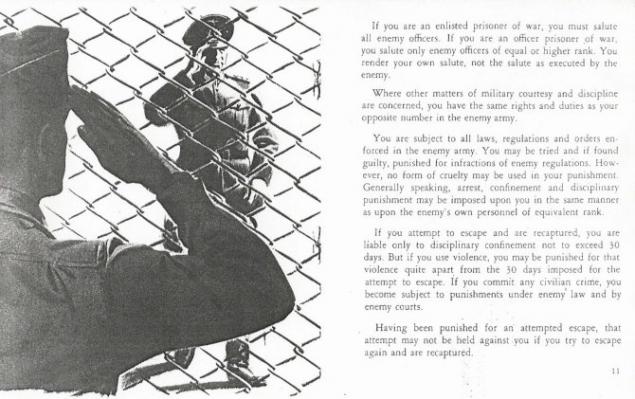
One of your most important rights is the right to require you to show a copy of the Geneva Convention relative to the Treatment of Prisoners of War. It must be in English.
If you do not ask for a copy of the Geneva Convention and does not read it, then it is your own merit, that some of your rights away from you utayat.
All war instilled in which you live in captivity, are contained in the Geneva Convention. Let the formal title does not confuse you. The text containing the much needed information for you, clear and easy to write. If you there is something not clear, you have the right to appeal through its representative to the camp administration for an explanation.
Suppose that the Geneva Convention will be your main field manuals during captivity.
Read it!
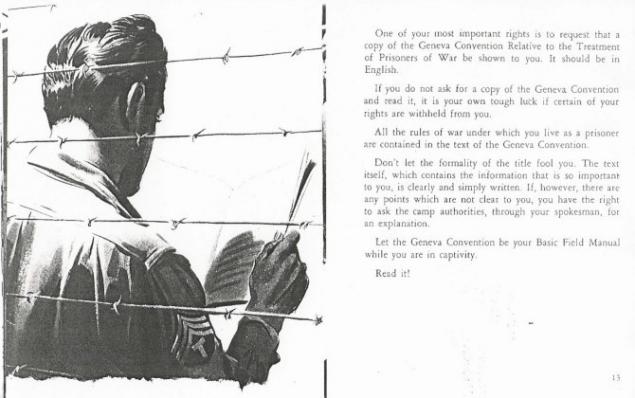
One of the most important, the Geneva Convention which guarantees the right of prisoners of war is to choose the same prisoner as its representative to resolve any issues with the administration of POW camps or with representatives of the Protecting Powers. However, the representative must be approved by the administration of the camp. All protests or complaints that you want to do, should be done through your camp representative.
Protecting Power is a neutral country, which acts as a mediator for the resolution of complaints and grievances between you and the enemy.
Protecting Powers shall have the United States is Switzerland.
When the representative of the Government of Switzerland visited the camp where you are being kept, you have the right to speak privately with him if you want.
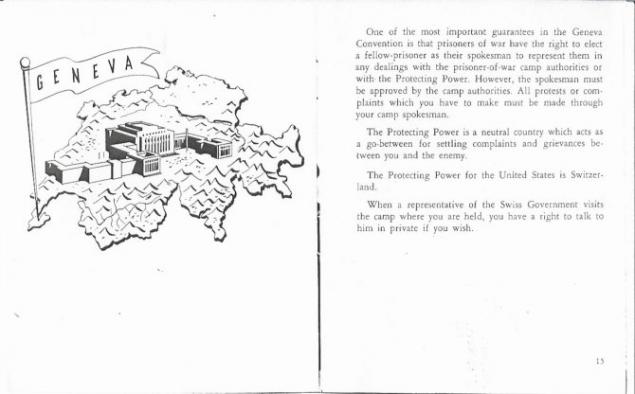
If you are an ordinary or PFC, you have to work in labor brigades will be ordered.
If you are a non-commissioned officer, you can only use for controlling the position.
If you are an officer, then you can not be assigned to any job, if you do not ask for that.
You will not be required to carry out dangerous or unhealthy work.
You should not draw any work of direct relevance to military action. For example - you should not use in the production and transport of arms or ammunition, or transporting any supplies for existing troops. If you are ordered to do it, you have the right to protest through a representative, but at the same time have to continue to do the work.
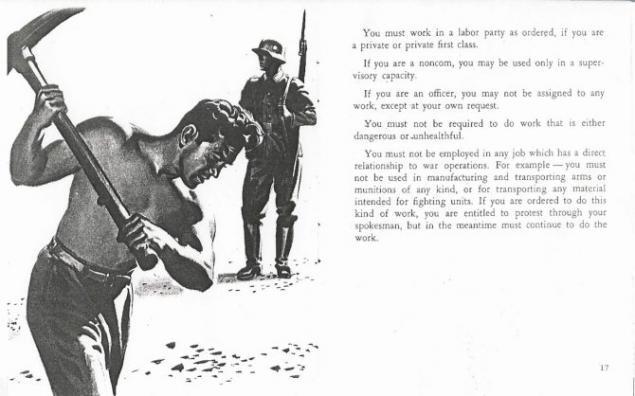
Here are some of the rights guaranteed to you by the Geneva Convention:
You can receive letters and parcels from home. You can write a specified number of letters every month.
You can tell his family that were captured.
You can get the book.
You can save your religion.
As a prisoner of war in a difficult position, but -
The army has not forgotten you -
The Red Cross and the Protecting Powers do everything possible for you -
Your family and friends know where you are and will contact with you -
Your own soldier's pride is always with you.
Posted in [mergetime] 1373276888 [/ mergetime]
All.
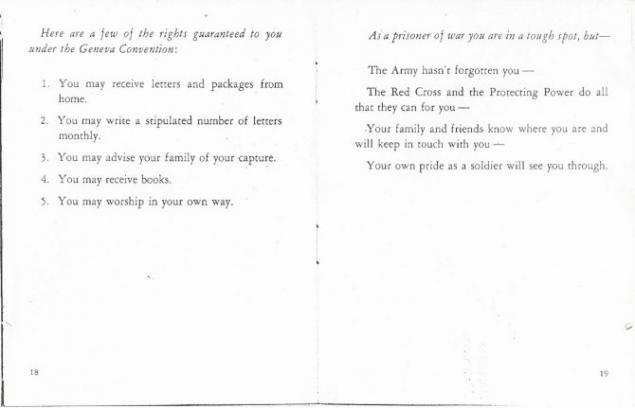
Source:
Will be taken into captivity
Here are your rights
10 photo.

The purpose of this booklet introduce you to some of the rights of a prisoner of war. Knowing them can help to survive what is happening less severe and humiliating, if you still are not lucky and you will be captured by the enemy.
And remember this: The United States treat prisoners in accordance with the rules. You have the right to request from the prison you do the same.
Military Department,
25 Washington, DC, May 16, 1944
The pamphlet Military Department № 21-7. "If you will go into captivity, that's your right," published for the information and guidance of all concerned.
{A.G. 383.6 (21 Mar 44)}
By order of the Secretary of War:
Dzh.Si. Marshall
Chief of Staff
Responsibility:
Jay. Hey. Yulio
Major General,
Adjutant General
I'll be a prisoner of war.
You live behind barbed wire, under constant guard.
You can not move freely because the prisoners comes change. You are there for a long time.
Terrible monotony.
Everything reminds guardhouse with indefinite sentences. Everything happens harder and longer than the prisoners, whom you once saw as a security guard in the United States.
However, even in the guardhouse prisoners remained in a rich, friendly country. As a prisoner of war, you are in the enemy country, living with the enemy. You live no better than the enemy, and it is unlikely as well as American soldiers. If you're lucky, your invader will treat you no better than with his rear troops. In all countries of the Axis of food goes mostly to the front. In the rear of the population eats, what was left. As a prisoner of war, you do not have to count on one or the other.
Nevertheless, there are certain rules of war. "Geneva Convention on prisoners of war status" contains the rules that say what you should do and what you can do. She also says that the enemy can and can not do with you.

From the moment you captured you have certain rights. Even more, before you were taken to the prison camp, these rights are.
Defend their rights, but does it always with military courtesy and firmness. The enemy will respect you for it.
With you always have to be treated humanely.
Illegal punishment against you are not permitted. You can not be to punish for what he did anyone else.
You need to be protected from abuse or violence by the military or civilians of the enemy.
If you are injured or ill, you are entitled to the same medical treatment as soldiers of the enemy army.
The enemy is obliged to clothe, feed and provide you with shelter.
You are a prisoner of war, and not a criminal.

During the interrogation, regardless of the position of the enemy, you must give his name, rank and identification number. The enemy can not legally obtain other information from you.
Do not discuss with anyone else any military matters.
Soldier "allies" can be an agent of the enemy intelligence.
Forget everything you know about their Army. Do not say anything if someone wants to talk to you even minor details

The enemy, grab you, you are obliged to hand over all military materiel, in addition to a helmet and a gas mask. In any case, the enemy does not have to take your personal belongings such as your documents, signs for the title, personal papers, wallet or photos (if they do not have military value).
You own the money can be taken only on the orders of an officer and after the determination of the exact amount. For this you are required to issue a receipt. Demand a receipt. It is your right.
Any money you have selected to be recorded in your own business, and returned after the liberation.

If you are an ordinary prisoner, then you have to give greetings to all officers. If you are a prisoner officer then you greet only enemy officers of equal or higher rank. You use your military salute, not the one the enemy.
With regard to other issues of military courtesy and discipline, you have the same rights and duties as the same enemy army soldier.
You are subject to all laws, regulations and orders in force in the army of the enemy. You may be subject to court and if found guilty, be punished for breaking the rules of the enemy. Nevertheless, in your punishment may not be accompanied by violence. In general, the arrest, detention and disciplinary action can be applied to you in the same way as a soldier of the enemy equal in rank.
If you try to escape and be captured, it can be subject to imprisonment not exceeding 30 days. However, if you use violence, then you can get punished much more than 30 days for attempting to escape. If you committed a civil offense, then you will be punished according to the civil laws of the enemy and the enemy tribunal.
After serving a sentence for attempted escape, the attempt will not be brought against you if you try to escape again and be caught.

One of your most important rights is the right to require you to show a copy of the Geneva Convention relative to the Treatment of Prisoners of War. It must be in English.
If you do not ask for a copy of the Geneva Convention and does not read it, then it is your own merit, that some of your rights away from you utayat.
All war instilled in which you live in captivity, are contained in the Geneva Convention. Let the formal title does not confuse you. The text containing the much needed information for you, clear and easy to write. If you there is something not clear, you have the right to appeal through its representative to the camp administration for an explanation.
Suppose that the Geneva Convention will be your main field manuals during captivity.
Read it!

One of the most important, the Geneva Convention which guarantees the right of prisoners of war is to choose the same prisoner as its representative to resolve any issues with the administration of POW camps or with representatives of the Protecting Powers. However, the representative must be approved by the administration of the camp. All protests or complaints that you want to do, should be done through your camp representative.
Protecting Power is a neutral country, which acts as a mediator for the resolution of complaints and grievances between you and the enemy.
Protecting Powers shall have the United States is Switzerland.
When the representative of the Government of Switzerland visited the camp where you are being kept, you have the right to speak privately with him if you want.

If you are an ordinary or PFC, you have to work in labor brigades will be ordered.
If you are a non-commissioned officer, you can only use for controlling the position.
If you are an officer, then you can not be assigned to any job, if you do not ask for that.
You will not be required to carry out dangerous or unhealthy work.
You should not draw any work of direct relevance to military action. For example - you should not use in the production and transport of arms or ammunition, or transporting any supplies for existing troops. If you are ordered to do it, you have the right to protest through a representative, but at the same time have to continue to do the work.

Here are some of the rights guaranteed to you by the Geneva Convention:
You can receive letters and parcels from home. You can write a specified number of letters every month.
You can tell his family that were captured.
You can get the book.
You can save your religion.
As a prisoner of war in a difficult position, but -
The army has not forgotten you -
The Red Cross and the Protecting Powers do everything possible for you -
Your family and friends know where you are and will contact with you -
Your own soldier's pride is always with you.
Posted in [mergetime] 1373276888 [/ mergetime]
All.

Source:
